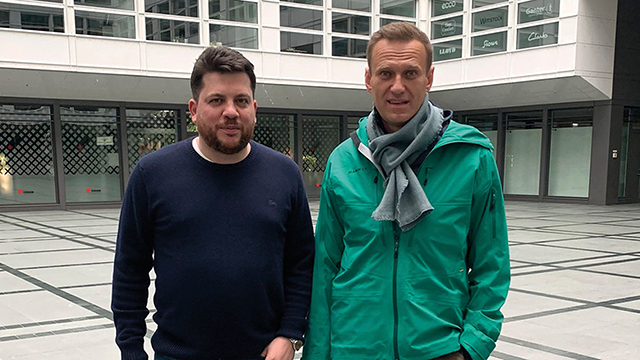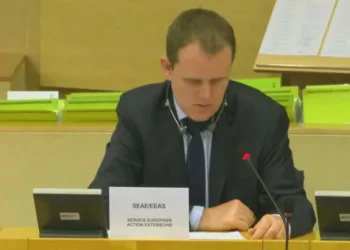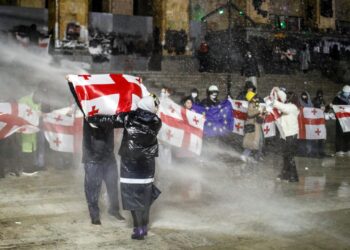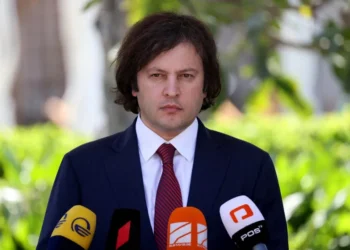“Navalny’s Russia will try to find a solution for Georgia and Ukraine, but we can’t promise it will be an easy one.”
With his health significantly worsening and the Kremlin all too happy to deny him proper medical treatment, it looks like Alexey Navalny has only last resort measures left at his disposal: Last week, the jailed opposition leader declared a hunger strike. With their leader imprisoned, Putin unlikely to budge, and the West so far limiting itself to rhetoric and calls for his release, the burden to tip the scales might fall on his teammates, many of whom are in exile – and their plan is to organize “A mass protest of a scale that Russia has never seen before”. Considering what Russia has seen before, it looks to be a gargantuan feat one could be forgiven for being curious about. To that end, one of Navalny’s closest allies, Leonid Volkov, himself in exile, spoke to the Spectator and GISP in a joint interview about what Navalny-ism stands for, Team Navalny’s vision of “European Russia,” its relationship with the West and the proverbial “far abroad,” and more.
Back in January, you claimed that Putin would not be so crazy as to order Navalny killed in prison. Taking recent events into consideration, are you still of the same mind?
Well, I still hope that pressure from both inside and outside of Russia will be enough to prevent Putin from attempting anything like that. We have to do everything we can to create a limit Putin would be wary to cross. He is still quite rational, well, as far as crazy dictators are concerned; he tries to compare the possible gains and losses from his actions. He still has good political intuition. After all, they didn’t shoot Navalny in the head: they tried to poison him without leaving any traces, so that blame wouldn’t be put at their door. It’s a miracle he survived. Now that the world knows that Navalny is in Putin’s custody, he’s under more scrutiny, and hopefully remains sane enough not attempt anything.
One of the key aspects of your strategy to apply as much pressure on Putin as possible is the “unprecedented mass protests” that you’ve announced. You claim it will be one “Putin won’t be able to disperse.” And if he tries to, what then?
Well, our plan is to have one million people out in the streets. To that end, we asked half a million people to register, to announce publicly that they will be joining us. When we reach this threshold, we will announce the date of the rally. With half a million people already on the streets, the personal risks will be lower: even if they arrest 10,000 people, as they did in January, that’s just 2% of the overall number. It’s much more complicated for the Kremlin to crack down on larger rallies. There are risks of being beaten, arrested, fined, being fired at, and getting hurt, but the only way to minimize these risks is to persuade people to change their collective behavior. More participants means less individual risk for any of them. And we believe that a demonstration of a million people can’t really be dispersed. We, the Navalny team, are campaigning to free Alexey, but it’s not a rally solely for Navalny’s supporters: if you’re unhappy with Putin for whatever reason, economical, ecological, political, join us. Because if you’re a small group, you will be dispersed, you won’t be heard. But there is strength in numbers. We have a core number of 500,000 people who want to free Navalny, so join us with your own demands and slogans and let’s have a really huge wave of protests.
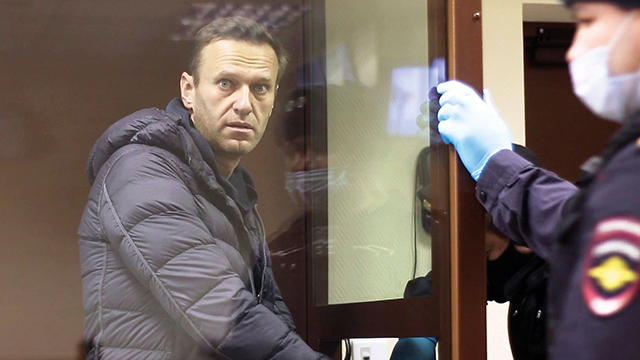
Why would Putin agree to your demands, considering this would basically mean an end to a reign that he modified the constitution to prolong?
It’s very clear that Putin wants to stay in the Kremlin as long as he lives. But we are targeting not only Putin personally: we hope to achieve some kind of split and division amongst his inner circle. We we want to make some of his cronies or supporters to rethink their personal strategy. That’s the most plausible scenario for any possible change in the Kremlin.
You say that, to quote you directly, “Our confrontation with Putin is not ideology based. Because his only ideology is centered on getting rich at the cost of the Russian people.” Fair enough, but what is Navanly-ism? Apart from being anti-corruption, what is the political philosophy of the movement?
Frankly, being anti corruption is actually a philosophy, because Putin’s Russia is built on corruption, it’s a cornerstone. You can’t describe Putin in terms familiar to any Western audience: Putin doesn’t belong on the Left/Right spectrum; he is neither conservative nor liberal in the ways those terms are understood. He and his chosen elite consider the whole country to be a source of personal income. And institutions such as a free and independent judiciary, fair elections, a free media, things usually associated with a democratic European country, he wants to terminate, because these institutions don’t allow corruption to happen. Because if there is an independent court, or free journalists, or free elections, then of course, corruption can be called out by these institutions. Since Russia lacks all of these institutions, Russian citizens are now not in the position to have a political discussion on what kind of country they would like to live in: do they want a more liberal or more distributive economy? More social care, or more of a focus on entrepreneurship? Russian citizens don’t have the tools to shape their own future. So our political philosophy is to give them these tools, and then let them decide.
As massive an issue as corruption is, imperial ambitions and people cheering for them: is this also not borne out of corruption? The war against Georgia and then more recently in Ukraine were not unpopular campaigns in Russia, but they’re still problems. How do Navalny & Co intend to tackle them?
Putin has inflicted many wounds on the world map in his 20 years: Transnistria, South Ossetia, Abkhazia, Crimea, and South Eastern Ukraine. And there could be more: Belarus could easily become the next target. Every time Putin sees his approval ratings drop in Russia, he tries to win it back with some foreign political adventure, some use of military power. And we used it, actually, in our campaign in 2017, when we were trying to get Alexey on the presidential ballot for the upcoming elections. We were touring throughout the country, visited about 50 cities, and he got the most enthusiastic applause and response when he’d ask a question such as ‘we are now investing million in in rebuilding Palmyra in Syria, wouldn’t we rather invest those million in rebuilding Omsk or the city where we are now?’ And this narrative sets a natural limit to Putin’s adventures.
“Discontinuation of the enormous financial giveaway to the [ed: breakaway] territories will also open ways for possible conflict resolution through international cooperation.”
Now that the Crimea effect has faded, people understand that it’s not an asset, it’s a liability. Even the most ardent supporters of the Crimea’s annexation, who have no qualms about violating international treaties or borders, now realize what a monstrously huge financial burden this has become, because billions are being invested in those annexed regions. This is not for the benefit of Russian taxpayers, and we use it as an argument in internal politics. But from an external politics perspective, it’s very clear that Putin’s Russia will never do anything to resolve these disputes, because this a swamp of Putin’s own making. And we believe that Putin has inflicted some wounds that might be too deep to be healed easily.
Unfortunately, not every crime is easily reversible. So, for instance, the questions most often posed to us are over the Crimea issue. Of course, we admit the annexation of Crimea was illegal. This was a crime against international law, and also a crime against Russian national interests, because it made Russia a non-credible and untrustworthy actor in international relations. It has led to sanctions against Russia, but we are still left with the reality that now we have about 2.5 million people with Russian passports, and somehow their will has to be taken into consideration, and there is no easy solution to this. So, some new legal framework will have to be created and probably many years will have to pass before a solution is elaborated. Navalny’s Russia will try to find such a solution for Georgia and Ukraine, but we can’t promise there will be an easy solution, and I think that’s a realistic approach.
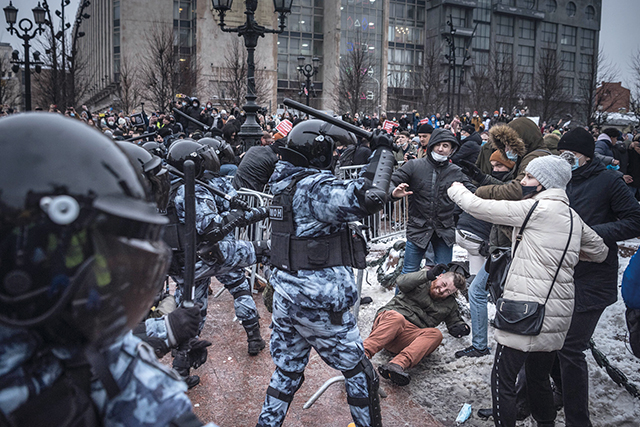
All these regions are entirely dependent on ongoing Russian support with finances, and especially with the military. Would that continue in Navalny’s Russia?
Definitely not. It’s not in the interest of Russian taxpayers to pump money in those territories. And we believe that the discontinuation of the enormous financial giveaway to these territories will also open some ways for the possible conflict settlements through international cooperation.
Staying on the topic of Navalny’s Russia, what would relations with the West be like? Would Russia pursue friendlier ties with Europe, perhaps becoming a part of the EU as well?
Absolutely. Russia historically belongs in Europe. Russia has long been a part of Europe, one of the more important European powers in fact. Culturally, economically, scientifically, politically, Russia belongs there. Russians are very open to the idea of free trade with Europe and free travel into Europe; Russians would be very enthusiastic to become part of the European Union in the future, I think. And we don’t see any fundamental obstacles to this, despite the fact that of course, a lot of things should be adjusted and rebuilt after Putin’s reign comes to an end.
And for that end to be any time soon, you’d probably need the West’s support more than ever before. How satisfied are you so far with the measures taken by the West regarding the Navalny case, including calls to the Kremlin to release him? What do you think could be done better? What more is there to do?
Since all Putin cares about is money, the West should go after Putin’s money, I think that’s the most important lesson we’ve learned. When we did this investigative piece on his palace, we actually managed to get a glimpse of how his mind works: we got inside his head. We’re talking about a guy who has had about 20 years of absolute power, and ruling an incredibly rich country. He could fulfill any dream, he could fly to Mars. He could have built whatever he wished as his legacy. But his dream apparently was to hoard a lot of gold-adorned items wrapped in red satin. He really cares the most about money, about personal wealth. He’s definitely one of the wealthiest people in the world. So if you want to have leverage against Putin, if you really want to push him into doing something, you have to go after his money.
We know that enormous amounts of money are being exported from Russia to the West. The official data suggests that the flow of capital out of Russia is about $50 to 60 billion annually, but this is the official figure, and there is a lot of smuggling and money laundering. And this money contributes to the Western economy. When Abramovich builds himself a new luxury yacht, for example, he creates hundreds of well-paid jobs in the Netherlands, or if another guy buys himself an apartment in Mayfair, it benefits those local economies. But one also has to admit the very clear fact that this is a lot like drug addiction: the later you want to shrug it off, the more complicated is it to get clean. As with drugs, this brings about dependence, and Europe has to learn to resist this dirty money, because this dirty money corrupts European political institutions, and the dependence on Russia comes in the package deal.
As enticing and entertaining the notion might be to go after Putin’s and his cronies’ money, why do you think it hasn’t happened so far, and where could such a chase lead?
It hasn’t happened so far because there is just no political will. If I’m a Russian government official, with 50 million pounds I’m willing to put somewhere, like in the British Virgin Islands or in the Cayman Islands, no questions are asked. Out of those 50 million, I could spend 50,000 a year to create a number of shell companies and then do whatever I want.
Interview by Vazha Tavberidze

